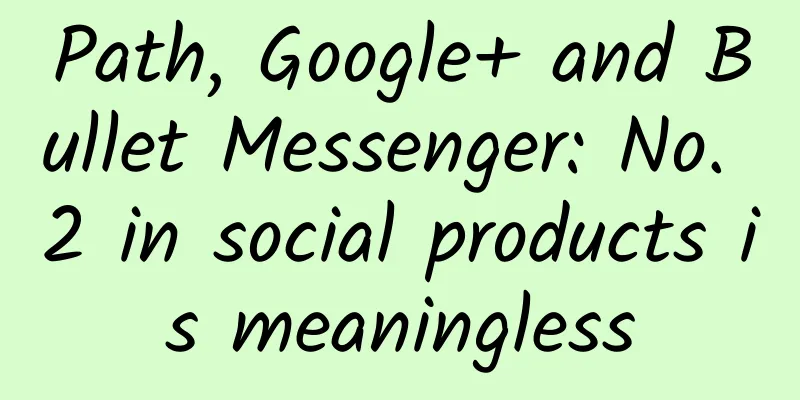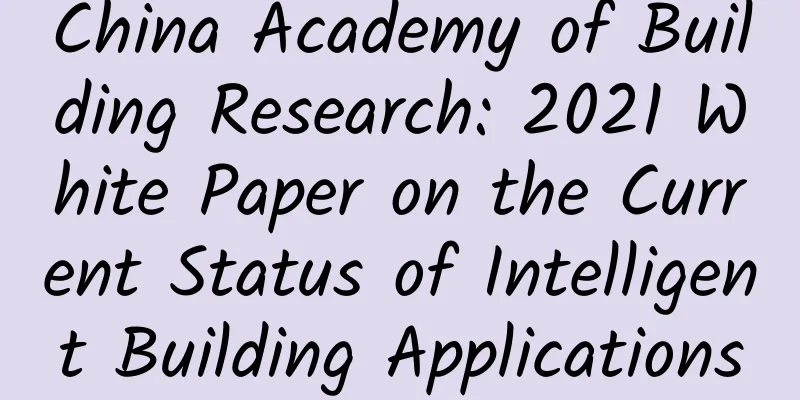Path, Google+ and Bullet Messenger: No. 2 in social products is meaningless

|
On October 18, all Path services were officially shut down. When I typed path.com in the browser, it showed that the server was not responding. This product, which had been in operation for 8 years, finally came to an end. Not long ago, Google announced that it would shut down the personal version of Google+ in August next year. Google+ was launched half a year later than Path. Like Path, it also targeted Facebook's "mistakes" and "weaknesses" to provide a more reliable and secure social service. However, like Path, it was shut down completely in its eighth year, which is regrettable. Many people will mention the issue of genes. Google does not have social genes, so it is not good at making social products. Similarly, Alibaba does not have social genes, so it is not good at Laiwang; Tencent does not have e-commerce genes, so it is not good at Paipai; Baidu also does not have e-commerce genes, so it is not good at Youa. Assuming that Google+ failed because Google didn’t have the social gene, what was the reason for Path’s failure? Dave Morin, the founder of Path, was an early executive of Facebook and the co-creator of Facebook platform and Facebook Connect. Morin was initially a staunch supporter of Zuckerberg's open social concept, but later he believed that Facebook's overly broad concept of "friends" and interaction model had bugs, and he planned to fix this bug with a new social product, which is Path. In 2011, I participated in many discussions on Path-related topics on Zhihu. As a person who firmly believes that Path is not a product based on user needs, but a self-righteous product based on a certain concept. Path-related topics I participated in on Zhihu The brilliant resume of Path's founder and the super-luxury entrepreneurial team drove investors crazy. Angel investment was in place before Path's product was launched; within the first two months of the product launch, it successfully raised two rounds of venture capital totaling $11 million; during this period, it also received a $100 million acquisition offer from Google. Initially, the upper limit of the number of friends on Path was 50, because Morin believed that you can have hundreds or thousands of friends, but the number of close friends who know you well and can interact frequently will not exceed 50. Many times, you don’t want to share the photos you take with hundreds or thousands of people, you only want to share them with your close friends. In my opinion, the user needs of Path were imagined from the beginning. Most of the time, when you take a photo, you can show it to anyone. You can post it on Weibo, Instagram, or Moments. Occasionally, you take an intimate photo with your girlfriend, which is really not suitable for public release. At this time, the best way to share the photo with her is to send it directly to her through AirDrop, or WeChat, or at least email her. Would you really share this photo with 50 close friends? A photo that is not suitable for public release can be shared in a circle of close friends with up to 50 people, and these close friends may include parents, childhood playmates, college classmates, confidantes, business partners and colleagues. I can't think of such a scenario. Morin believes that such demand can support Path to become a real challenger to Facebook. Faced with such a grand future, Morin certainly doesn't look down on Google's $100 million. Later, Path relaxed the upper limit of the number of friends to 150. Whether Morin admits it or not, I think it is a self-denial. However, Morin still insisted on the original design concept and product positioning of Path, which ultimately led to its failure to gain a decent market share in almost all markets. In the end, it was sold to Kakao of South Korea, which was eyeing the international market, relying on the Southeast Asian market, which was almost the only remaining market. However, Kakao failed to successfully renew Path. As an active user between 2010 and 2014, I posted 521 times on Path. I backed up all my data, but all the landmarks and interactions with friends were gone with the closure of Path. Many designers will still miss Path's innovation in mobile app interaction design, that's all. Google+ is similar. After Google co-founder Larry Page returned to the CEO position after 10 years, he launched an unprecedented major campaign with the whole company's strength, aiming to tear open the iron fence of Facebook, put the information blocked in Facebook back into the index range of Google search engine, and add a crucial social layer to Google's product architecture. However, Google's slogan is to make social networking more private, and different friends should be placed in different "circles". Google wants to rebuild the user's Internet relationship chain with "circles" that do not interfere with each other. But every time you add a friend, you have to choose a circle for him. Sometimes you often hesitate whether to add him to the circle of friends, the circle of colleagues, or the circle of drinking buddies, because the boundaries are actually blurred in many cases. Just like most people's bookshelves are not classified and arranged in an orderly manner like in a library, even if they are classified at the beginning, it won't take long for everything to be in chaos. Disorder is the norm in our lives, and order is actually anti-human. Google wants our friend lists to be orderly and organized, partly to be different from Facebook, and partly because of Google's inertial thinking as an information integrator. Google's engineers believe that the world is indeed chaotic and disordered, but order brings value. At first, Google+ seemed destined to succeed. From 0 to 20 million users, Facebook took 1,152 days, Twitter took 1,035 days, and Google+ took only 24 days. Google's huge user scale and product matrix make it relatively easy to attract users, but it is difficult to keep users using it. Yu Jun's user value equation can be used to express it:
The new experience brought by Google+ is not necessarily better than the old experience of Facebook, but the switching cost is extremely high - how much effort do I have to put in to add my Facebook friends to Google+ one by one? And even if I add them all, how can I guarantee that they will use Google+ as their main social platform like me? Those people who used to stay in touch on one platform now have to stay in touch with them on two platforms. Isn't this just a waste of time? Although Google+'s initial growth looked quite impressive, it did not affect Facebook's growth at all. Moreover, in the first two years when Google's growth was the best, Google+'s presence was far less than Facebook's in any region of the world. Google Trends shows a comparison of Google+ and Facebook trends The failure of Google+ has nothing to do with whether Google has social genes or not. It is because Google+ has never provided a better product than Facebook, and the switching cost of social networks is too high to bear. Failure is basically inevitable, but Google has been unwilling to admit it because of the face of its founder. The decision to shut down the personal version of Google+ this time is also under the pretext of privacy and security, shutting down a product that should not have existed in the first place. Similarly, Alibaba failed Laiwang not because it lacked social genes, but because it used its usual means of big promotions, desperately trying to show its presence, and high-profile PR to promote something that must be actively driven by users, and this thing must be better and more detailed than WeChat to have a slight chance. Apart from Alibaba itself, did anyone really have high hopes for Laiwang? In the social battlefield, latecomers are often eager for quick success and impatient. They are eager to defeat the enemy in one move and to come from behind to win, but this is always a delusion. It is said that Tencent, which has social genes, should not have ruined Weibo and Weishi, but the fact is that Tencent has never done well with social media such as Weibo and Weishi. I acknowledge the existence of path dependence, but I never believe in the so-called genetic determinism of Internet products. Tencent cannot do e-commerce because it has never had the idea of investing heavily in cultivating the e-commerce market like Alibaba. At the beginning of the development of e-commerce, Alibaba only spent money but did not make money. Taobao announced that it would not make money for three years. After the three-year period, it would add another three years before you could reap the fruits of this market. Two months ago, someone on Dabow asked me a question about Bullet Messenger: "I downloaded it today and tried it out. It's like a chat app like WhatsApp. It feels clean and comfortable to use. In comparison, WeChat is a bit bloated now and carries too many things. Do you think Bullet Messenger is a threat to WeChat? Is it a competitor of WeChat?" My question and answer about bullet text messages on Big Bow Here is my answer:
I have never used Bullet Messenger and have no interest in using it. Now is not the time to create another instant messaging tool. For comprehensive social products, it is meaningless to be the second one, because the first one almost meets all the needs of all users, and there is nothing left for the second one to pick up. Luo Yonghao said: "Bullet Messenger will have no problem converting tens of millions or even 100 million users in specific demand areas. If we can get 10%-20% market share in communication tools, we can build a company with a valuation of tens of billions or even hundreds of billions." He was too optimistic. Google+ was once more optimistic than him and seemed to have better opportunities than him, but it took 8 years before admitting failure. Can the Luo Yonghao effect keep Bullet Messenger going for 8 years? |
<<: What you need to know about Photoshop CC for iPad
>>: What do you think if the next generation iPhone keeps the big bangs design?
Recommend
Ten writing secrets taught to me by a world-class master!
"The Shawshank Redemption" is adapted f...
Luxgen's new U6 SUV spy photos may be equipped with PSA engine
Recently, domestic media exposed a set of spy pho...
What are the functions of the car mini program? How much does it cost to develop a WeChat car mini program?
In 2021, China's car ownership will reach 350...
Heartbroken! Two boys in Hangzhou drowned in swimming pools! Pediatric experts: In addition to rivers and ponds, swimming pools have become a high-risk area for drowning
Summer vacation is here and the heat is unbearabl...
A "Spider Seal" was discovered in Qingcheng Mountain. Its exquisite pattern resembles a copper coin. Could it have evolved naturally?
The Richter's disc-bellied spider has a very ...
What new ways are there to distribute short videos across the entire network and create hits?
Nowadays, short videos have become a new trend th...
Which ocean satellites has my country independently developed?
my country has always attached great importance t...
How should short video advertisements such as Douyin and Kuaishou be placed?
1. Take a holistic view and use data to understan...
Look at these cases. Autonomous driving is not easy either.
Recently, Tesla's Autopilot autonomous drivin...
Classic GuangDianTong advertising case, GuangDianTong advertising case for Xiaomi Redmi smartphones
Xiaomi Redmi mobile phone Guangdiantong advertisi...
I spent 600 yuan in the morning and didn’t get any conversations, but my creative idea had a high click-through rate. How can I solve this problem?
Recently, I have received many messages from frie...
A complete marketing planning template!
The complete market plan is mainly divided into t...
The eighth course of the Xiaomao Qianqian Writing Training Camp
The course comes from the eighth session of Xiaom...
Mobile APP and game promotion, why can’t we achieve significant results even though we have a budget?
Many people may not understand that in operations...
Can data-driven operations really lead to rapid user growth?
As the saying goes, "Good wine needs no bush...









